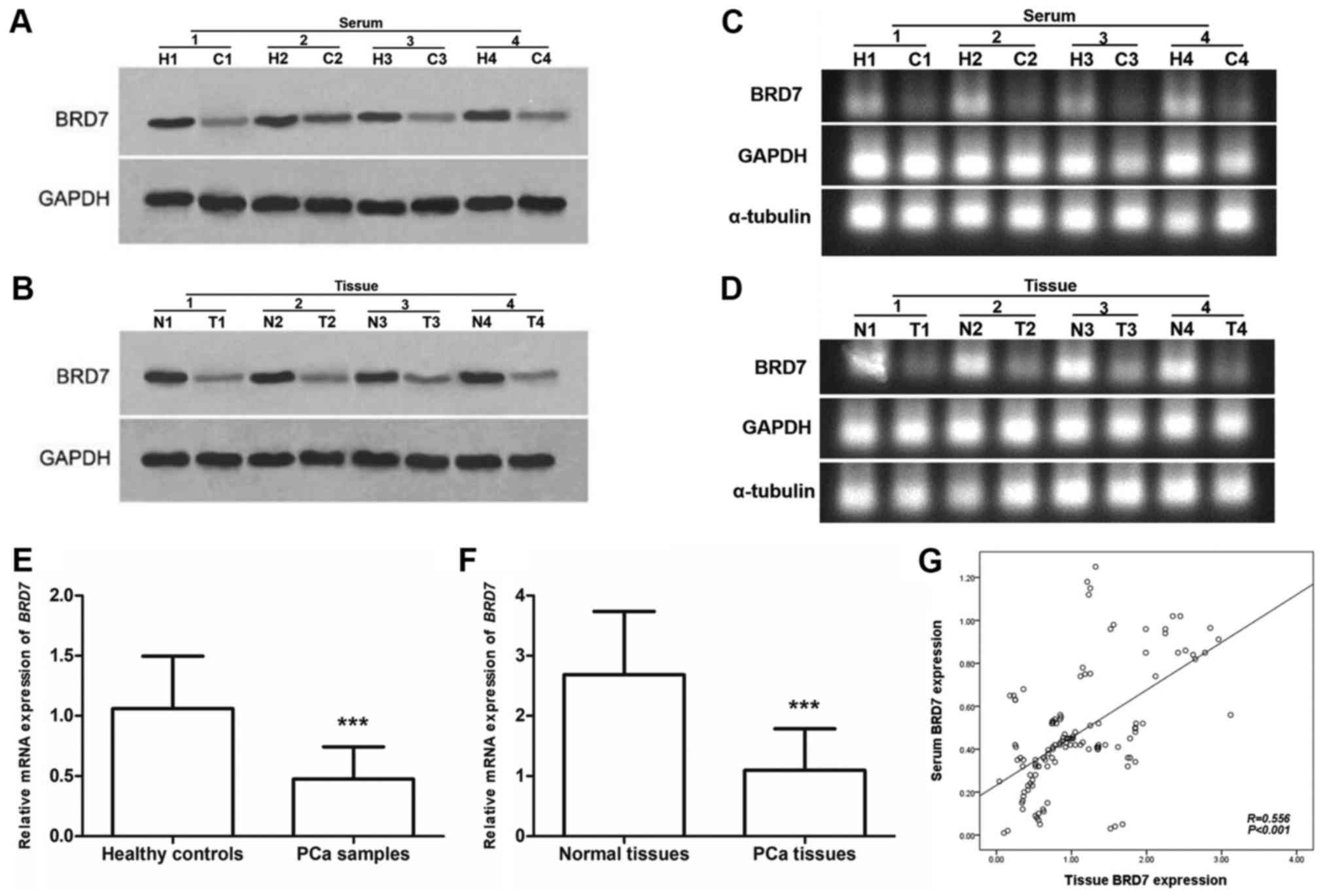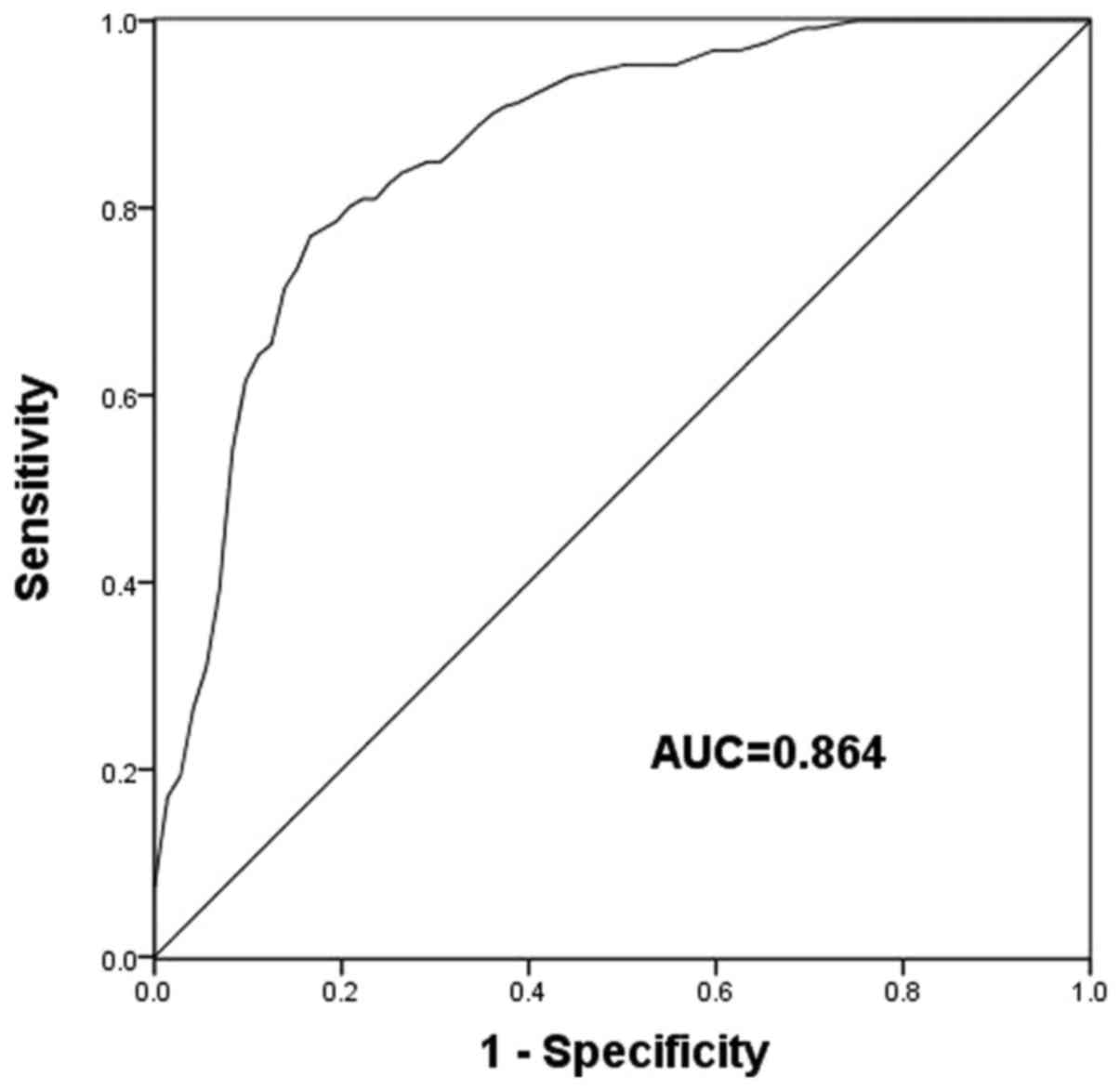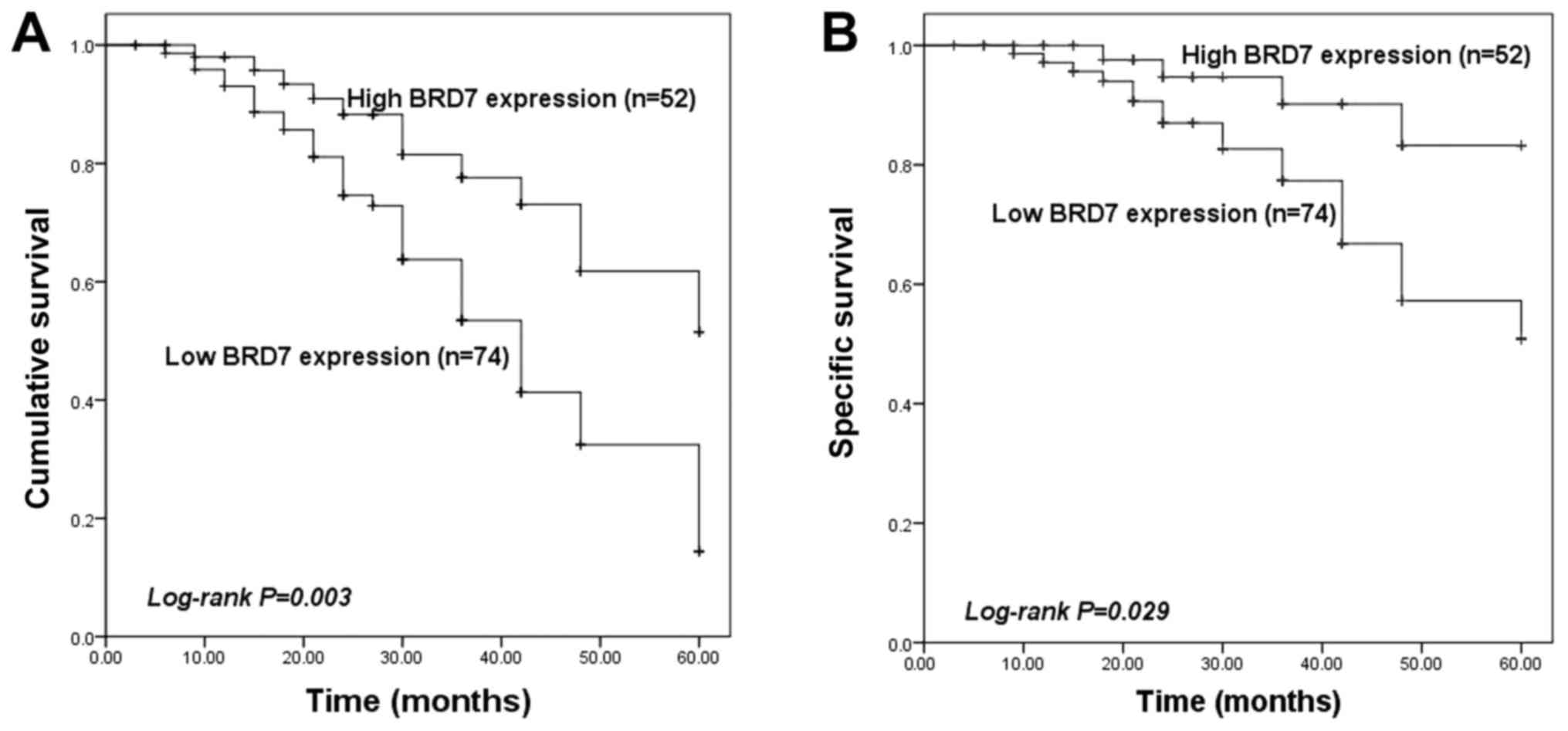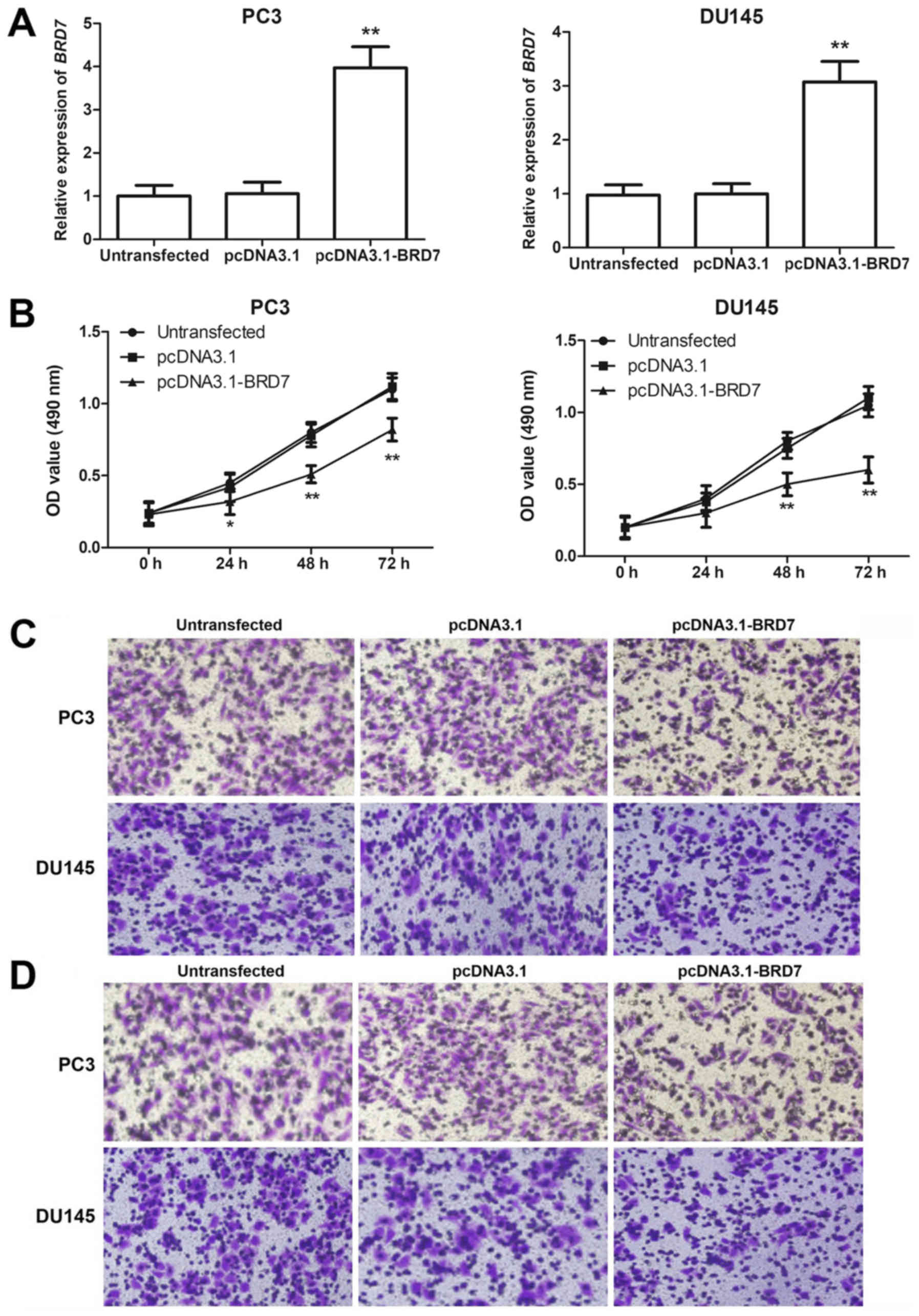|
1
|
Torre LA, Bray F, Siegel RL, Ferlay J,
Lortet-Tieulent J and Jemal A: Global cancer statistics, 2012. CA
Cancer J Clin. 65:87–108. 2015. View Article : Google Scholar : PubMed/NCBI
|
|
2
|
Feng S, Qian X, Li H and Zhang X:
Combinations of elevated tissue miRNA-17-92 cluster expression and
serum prostate-specific antigen as potential diagnostic biomarkers
for prostate cancer. Oncol Lett. 14:6943–6949. 2017.PubMed/NCBI
|
|
3
|
Matthes KL, Limam M, Dehler S, Korol D and
Rohrmann S: Primary treatment choice over time and relative
survival of prostate cancer patients: Influence of age, grade, and
stage. Oncol Res Treat. 40:484–489. 2017. View Article : Google Scholar : PubMed/NCBI
|
|
4
|
Wu J, Cheng G, Zhang C, Zheng Y, Xu H,
Yang H and Hua L: Long noncoding RNA LINC01296 is associated with
poor prognosis in prostate cancer and promotes cancer-cell
proliferation and metastasis. Onco Targets Ther. 10:1843–1852.
2017. View Article : Google Scholar : PubMed/NCBI
|
|
5
|
Center MM, Jemal A, Lortet-Tieulent J,
Ward E, Ferlay J, Brawley O and Bray F: International variation in
prostate cancer incidence and mortality rates. Eur Urol.
61:1079–1092. 2012. View Article : Google Scholar : PubMed/NCBI
|
|
6
|
Ren SC, Chen R and Sun YH: Prostate cancer
research in China. Asian J Androl. 15:350–353. 2013. View Article : Google Scholar : PubMed/NCBI
|
|
7
|
Zhu Y, Yang XQ, Han CT, Dai B, Zhang HL,
Shi GH, Wang CF and Ye DW: Pathological features of localized
prostate cancer in China: A contemporary analysis of radical
prostatectomy specimens. PLoS One. 10:e01210762015. View Article : Google Scholar : PubMed/NCBI
|
|
8
|
Steeg PS: Metastasis suppressors alter the
signal transduction of cancer cells. Nat Rev Cancer. 3:55–63. 2003.
View Article : Google Scholar : PubMed/NCBI
|
|
9
|
Kamigaito T, Okaneya T, Kawakubo M,
Shimojo H, Nishizawa O and Nakayama J: Overexpression of O-GlcNAc
by prostate cancer cells is significantly associated with poor
prognosis of patients. Prostate Cancer Prostatic Dis. 17:18–22.
2014. View Article : Google Scholar : PubMed/NCBI
|
|
10
|
Prensner JR, Rubin MA, Wei JT and
Chinnaiyan AM: Beyond PSA: The next generation of prostate cancer
biomarkers. Sci Transl Med. 4:127rv32012. View Article : Google Scholar : PubMed/NCBI
|
|
11
|
Pern F, Bogdanova N, Schürmann P, Lin M,
Ay A, Länger F, Hillemanns P, Christiansen H, Park-Simon TW and
Dörk T: Mutation analysis of BRCA1, BRCA2, PALB2 and BRD7 in a
hospital-based series of German patients with triple-negative
breast cancer. PLoS One. 7:e479932012. View Article : Google Scholar : PubMed/NCBI
|
|
12
|
Yoo HM, Kang SH, Kim JY, Lee JE, Seong MW,
Lee SW, Ka SH, Sou YS, Komatsu M, Tanaka K, et al: Modification of
ASC1 by UFM1 is crucial for ERα transactivation and breast cancer
development. Mol Cell. 56:261–274. 2014. View Article : Google Scholar : PubMed/NCBI
|
|
13
|
Dhalluin C, Carlson JE, Zeng L, He C,
Aggarwal AK and Zhou MM: Structure and ligand of a histone
acetyltransferase bromodomain. Nature. 399:491–496. 1999.
View Article : Google Scholar : PubMed/NCBI
|
|
14
|
Drost J, Mantovani F, Tocco F, Elkon R,
Comel A, Holstege H, Kerkhoven R, Jonkers J, Voorhoeve PM, Agami R
and Del Sal G: BRD7 is a candidate tumour suppressor gene required
for p53 function. Nat Cell Biol. 12:380–389. 2010. View Article : Google Scholar : PubMed/NCBI
|
|
15
|
Harte MT, O'Brien GJ, Ryan NM, Gorski JJ,
Savage KI, Crawford NT, Mullan PB and Harkin DP: BRD7, a subunit of
SWI/SNF complexes, binds directly to BRCA1 and regulates
BRCA1-dependent transcription. Cancer Res. 70:2538–2547. 2010.
View Article : Google Scholar : PubMed/NCBI
|
|
16
|
Mantovani F, Drost J, Voorhoeve PM, Del
Sal G and Agami R: Gene regulation and tumor suppression by the
bromodomain-containing protein BRD7. Cell Cycle. 9:2777–2781. 2010.
View Article : Google Scholar : PubMed/NCBI
|
|
17
|
Yu X, Li Z and Shen J: BRD7: A novel tumor
suppressor gene in different cancers. Am J Transl Res. 8:742–748.
2016.PubMed/NCBI
|
|
18
|
Peng C, Liu HY, Zhou M, Zhang LM, Li XL,
Shen SR and Li GY: BRD7 suppresses the growth of Nasopharyngeal
Carcinoma cells (HNE1) through negatively regulating beta-catenin
and ERK pathways. Mol Cell Biochem. 303:141–149. 2007. View Article : Google Scholar : PubMed/NCBI
|
|
19
|
Balasubramanian A, Subramaniam R,
Narayanan V, Annamalai T and Ramanathan A: BRD7 promoter
hypermethylation as an indicator of well differentiated oral
squamous cell carcinomas. Asian Pac J Cancer Prev. 16:1615–1619.
2015. View Article : Google Scholar : PubMed/NCBI
|
|
20
|
Kikuchi M, Okumura F, Tsukiyama T,
Watanabe M, Miyajima N, Tanaka J, Imamura M and Hatakeyama S:
TRIM24 mediates ligand-dependent activation of androgen receptor
and is repressed by a bromodomain-containing protein, BRD7, in
prostate cancer cells. Biochim Biophys Acta. 1793:1828–1836. 2009.
View Article : Google Scholar : PubMed/NCBI
|
|
21
|
Livak KJ and Schmittgen TD: Analysis of
relative gene expression data using real-time quantitative PCR and
the 2(-Delta Delta C(T)) method. Methods. 25:402–408. 2001.
View Article : Google Scholar : PubMed/NCBI
|
|
22
|
Parnes HL, House MG and Tangrea JA:
Prostate cancer prevention: Agent development strategies. Recent
Results Cancer Res. 202:121–131. 2014. View Article : Google Scholar : PubMed/NCBI
|
|
23
|
Chang K, Kong YY, Dai B, Ye DW, Qu YY,
Wang Y, Jia ZW and Li GX: Combination of circulating tumor cell
enumeration and tumor marker detection in predicting prognosis and
treatment effect in metastatic castration-resistant prostate
cancer. Oncotarget. 6:41825–41836. 2015. View Article : Google Scholar : PubMed/NCBI
|
|
24
|
Zhou L, Xia D, Zhu J, Chen Y, Chen G, Mo
R, Zeng Y, Dai Q, He H, Liang Y, et al: Enhanced expression of
IMPDH2 promotes metastasis and advanced tumor progression in
patients with prostate cancer. Clin Transl Oncol. 16:906–913. 2014.
View Article : Google Scholar : PubMed/NCBI
|
|
25
|
Salinas CA, Tsodikov A, Ishak-Howard M and
Cooney KA: Prostate cancer in young men: An important clinical
entity. Nat Rev Urol. 11:317–323. 2014. View Article : Google Scholar : PubMed/NCBI
|
|
26
|
Tabayoyong W and Abouassaly R: Prostate
cancer screening and the associated controversy. Surg Clin North
Am. 95:1023–1039. 2015. View Article : Google Scholar : PubMed/NCBI
|
|
27
|
Xu Y, Cao W, Zhou M, Li C, Luo Y, Wang H,
Zhao R, Jiang S, Yang J, Liu Y, et al: Inactivation of BRD7 results
in impaired cognitive behavior and reduced synaptic plasticity of
the medial prefrontal cortex. Behav Brain Res. 286:1–10. 2015.
View Article : Google Scholar : PubMed/NCBI
|
|
28
|
Zhou M, Liu H, Xu X, Zhou H, Li X, Peng C,
Shen S, Xiong W, Ma J, Zeng Z, et al: Identification of nuclear
localization signal that governs nuclear import of BRD7 and its
essential roles in inhibiting cell cycle progression. J Cell
Biochem. 98:920–930. 2006. View Article : Google Scholar : PubMed/NCBI
|
|
29
|
Park YA, Lee JW, Kim HS, Lee YY, Kim TJ,
Choi CH, Choi JJ, Jeon HK, Cho YJ, Ryu JY, et al: Tumor suppressive
effects of bromodomain-containing protein 7 (BRD7) in epithelial
ovarian carcinoma. Clin Cancer Res. 20:565–575. 2014. View Article : Google Scholar : PubMed/NCBI
|
|
30
|
Chen CL, Wang Y, Pan QZ, Tang Y, Wang QJ,
Pan K, Huang LX, He J, Zhao JJ, Jiang SS, et al:
Bromodomain-containing protein 7 (BRD7) as a potential tumor
suppressor in hepatocellular carcinoma. Oncotarget. 7:16248–16261.
2016.PubMed/NCBI
|
|
31
|
Park YA, Lee JW, Choi JJ, Jeon HK, Cho Y,
Choi C, Kim TJ, Lee NW, Kim BG and Bae DS: The interactions between
MicroRNA-200c and BRD7 in endometrial carcinoma. Gynecol Oncol.
124:125–133. 2012. View Article : Google Scholar : PubMed/NCBI
|
|
32
|
Wu WJ, Hu KS, Chen DL, Zeng ZL, Luo HY,
Wang F, Wang DS, Wang ZQ, He F and Xu RH: Prognostic relevance of
BRD7 expression in colorectal carcinoma. Eur J Clin Invest.
43:131–140. 2013. View Article : Google Scholar : PubMed/NCBI
|
|
33
|
Hu K, Liao D, Wu W, Han AJ, Shi HJ, Wang
F, Wang X, Zhong L, Duan T, Wu Y, et al: Targeting the
anaphase-promoting complex/cyclosome (APC/C)-bromodomain containing
7 (BRD7) pathway for human osteosarcoma. Oncotarget. 5:3088–3100.
2014. View Article : Google Scholar : PubMed/NCBI
|
|
34
|
Gao Y, Wang B and Gao S: BRD7 acts as a
tumor suppressor gene in lung adenocarcinoma. PLoS One.
11:e01567012016. View Article : Google Scholar : PubMed/NCBI
|


















